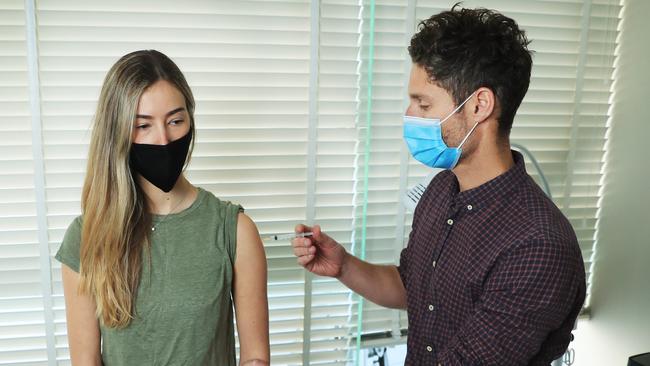‘More to consider’ with AstraZeneca vaccine
Experts say weighing up the risk of hospitalisation from Covid-19 versus the benefit of a vaccine now should not be the only factor young people consider in deciding whether to get the AstraZeneca shot.

Experts say weighing up the risk of hospitalisation from Covid-19 versus the benefit of getting a vaccine straight away should not be the only factor young people consider in deciding whether to get the AstraZeneca shot.
According to the Australian Technical Advisory Group on Immunisation, about three people aged under 50 are likely to suffer a rare blood clotting disorder out of every 100,000 who receive a first dose of AstraZeneca vaccine.
Out of every 25 cases of the condition known as thrombosis with thrombocytopenia (TTS), there is likely to be one death, based on Australia data.
Many countries around the world have moved to restrict the AstraZeneca vaccine to older people in the same way as Australia. The United Kingdom’s policy is that those aged between 18 and 39 are offered an alternative to the AstraZeneca vaccine, where a different vaccine is available and provided it does not cause delays in being fully vaccinated.
There have been 27 cases of TTS experienced by people aged between 18 and 29 in the UK following the AstraZeneca vaccine, and six deaths in that age group. Among peopled aged between 30 and 39, there have been 49 reports of TTS and 11 deaths.
In terms of the number of blood clots recorded versus vaccines given in the UK in young people, there have been 10.1 cases of blood clots per million doses given in 40- to 49-year-olds, and 17.4 cases per million doses, or one in 60,000, among those aged 30 to 39.
Respiratory physician Christine Jenkins, the head of the respiratory group at The George Institute for Global Health Sydney, said young people needed to consider a wider array of benefits of getting the AstraZeneca jab against the blood clot risk.
She said the risk-benefit analysis could be more comprehensive than that carried out by ATAGI, which simply compares the risk of blood clots versus the number of hospitalisations and ICU admissions prevented.
“A different assessment of risk could be done using a different risk profile – one not based on comparing probability of ICU admission versus TTS,” Professor Jenkins said. “This risk analysis would compare the risk of transmission, getting the disease at all, losing time from work and infecting your family and friends to risk of TTS. These are far more likely events than ICU admission which is rare and an uncommon event for people under 50 years old.
“An analysis that includes more common but troubling events for under 50 year olds weighs up wider community benefit, and is not shackled by the issues ATAGI has said it has taken into account, would be likely to demonstrate a far more persuasive case for the AZ vaccine.”
She said young people should consider whether they wanted to be exposed to Covid-19 at all.
“Do young people want to be exposed to viral illness risk at all, not just ICU admission, but days of feeling very unwell, time off work sick, risk of long Covid? … Do they want to risk transmitting it to their parents, many of whom are older and have chronic diseases that make them very vulnerable to … ICU admission and death? If the answer is no, young people should get vaccinated and if the AstraZeneca vaccine is the only one they can get now, then they should go for it.”



